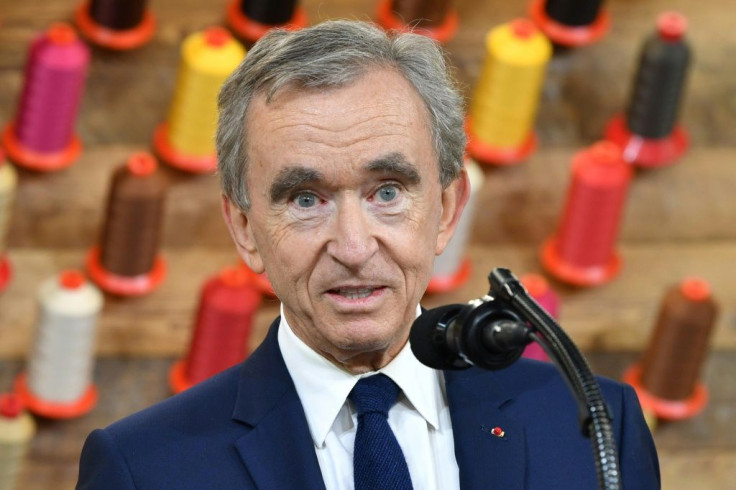Bernard Arnault, The Emperor Of Luxury, Has Tiffany For Breakfast

The world's second-richest man, Bernard Arnault, has built an unparallelled luxury empire that spans fashion to champagne, along with a reputation as a formidable and insatiable businessman.
His latest acquisition, the US jeweller Tiffany, a brand immortalised in popular culture with the 1961 film "Breakfast at Tiffany's" starring Audrey Hepburn, was announced as many Parisians were enjoying their morning coffee on Monday.
The $16.2 billion deal puts Arnault's LVMH luxury conglomerate at the top in the fine jewellery segment, and reinforces its position as the biggest pure player in luxury over all.
Slim and tall, Arnault didn't begin his career in the luxury sector.
Born in 1949 in the north of France, Arnault studied engineering at France's premier Ecole Polytechnique university before joining his father's construction and civil engineering company.
Having convinced his father to sell the construction arm of the company and concentrate on real estate, Arnault soon embarked on his long career of buying up businesses.
But not before he fled to the United States following the victory in 1981 for Francois Mitterrand's Socialists, who had vowed to implement a wealth tax.
He returned to France three years later and began his foray into the world of luxury by buying up the debt-ridden textile firm Boussac.
Arnault beat out competitors by promising to maintain jobs at the firm, but quickly launched a restructuring that slashed employment and left it only a few activities including the fashion house Christian Dior.
He emerged at the top of LVMH thanks to rivalries between the families which had owned leather goods maker Louis Vuitton and champagne and spirits group Moet-Hennessy, but only after 17 lawsuits.
Kenzo, Guerlain, Fendi, Celine, Chaumet, Sephora, Bulgari... Over the years LVMH's stable of luxury brands has continued to grow.
Arnault's business defeats have been few, but very public.
He lost Italian fashion and leather goods house Gucci to his French rival Francois Pinault, head of the PPR group (now Kering), in 1999.
He tried to take over Louis Vuitton's French rival Hermes, known for its silk scarves and sumptious leather handbags like the "Birkin," by secretly building up a stake in the firm, for which he was fined eight million euros ($8.8 million) by regulators.
But the operation still netted Arnault a capital gain of 2.4 billion euros.
Arnault's sharp-elbowed business tactics have made him a target for criticism, in particular in a searing 2016 documentary by French journalist and leftist activist Francois Ruffin.
The "Merci Patron" (Thanks boss) film is about a couple who lost their jobs when Arnault closed a factory manufacturing clothes for the luxurious Kenzo brand, outsourcing the work to Poland.
Arnault's response to the film, which he had not even seen, was unapologetic.
"When I arrived at the head of the (LVMH) group we were 20,000 (employees) and now we're 120,000; When it comes down to it, we epitomise the benefits of globalisation for France: it's a complete catastrophe!" he said with more than a hint of irony.
Arnault also won few friends among the French when he expressed his desire to get duel French-Belgian nationality.
He denied the move was aimed at avoiding a mooted 75 percent tax on the wealthy, saying instead it was related to his desire to develop his business investments in Belgium.
"He has an incredible sense of competition, a remarkable intelligence, as well as a lack of empathy in business that is the mark of great builders," said Arnaud Cadart, a portfolio manager at the French asset manager Flornoy and Associates.
"But he's not a Howard Hughes, he said, referring to the American tycoon who became increasing solitary and erratic as he got older.
"He's not isolated and has always surrounded himself with the best people," Cadart said. "He wants to be the best in all domains and he is also an ultra-modern manager who has introduced engineering methods to luxury."
Journalist Airy Routier was less kind in his unauthorised biography entitled "Terminator Angel," which bestowed on him such sobriquets as "discreet predator", "luxury Hussard", "French raider" and "business wolf".
Arnault's fortune has allowed him to indulge in one of his main passions: contemporary art.
He opened in 2014 his futuristic Louis Vuitton Foundation, a Frank Gehry-designed structure of glass sails in the Bois de Boulogne forest to the west of Paris.
Arnault never publicly revealed the building's cost, but in December 2018, an anti-fraud advocacy group filed a lawsuit claiming taxpayers had unfairly paid much of an estimated 790 million euro bill.
The foundation nonetheless contributed to his being awarded the David Rockefeller prize by the Museum of Modern Art in New York in 2014.
© Copyright AFP 2024. All rights reserved.





















